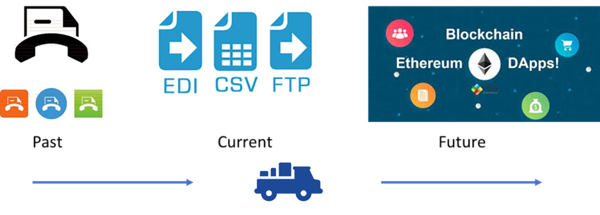Blockchain technology transforms transportation and logistics
Distributed Ledger Technology (DLT) is currently becoming a mainstream technology in the commercial logistics and transportation industry. New DLT-enabled platforms and services allow easy information sharing and coordination of documents, removing need for unnecessary paperwork and document exchanges.
The ability of DLT to record transactions between parties in a secure and immutable way offers superior solutions to some of the major inefficiencies that have troubled the industry for decades; by using it to authenticate data and transactions, the entire transportation network can securely contribute and validate data, thus bringing trust among the participants andmaking the eco-system no longer subject to tampering.
The usage of smart contracts can make approvals and suppliers’ clearances in goods boarding quicker and more efficient, reducing processing times at exchanging points, delays and risks levels of potential contamination.
Figure 1. The evolution of Information sharing in Logistics Services.
As estimated, today roughly 30% of global fresh fruits and vegetables are thrown away due to quality or safety issues as they are transferred. A high share of these losses is related to non-optimized handling during supply chain processes. In SOFIE Food Supply Chain pilot, DLTs and IoT are combined to track and securely record data that relate to goods transfer from the field to the market shelf. Within SOFIE Optimum, as a member of the food chain pilot help built a platform to create a secure environment to store this data and enable automated validation of transactions. IoT is used to enable trust on load board data and create real-time feedback monitoring temperature deviations during transportation, based on which immediate alarms can be created, e.g. when their quality has dropped below an acceptable limit. DLTs provide a tamper-proof, decentralized data storage that eliminates a single point of failure, enables fast traceability of data and authenticates smart objects to collect information and interact with each other.
Currently, large companies, such as Walmart and Nestle, cooperate with technology industry to explore benefits of implementing DLT in the logistics and goods supply chain. For instance, Walmart in collaboration with IBM’s Hyperledger succeeded to reduce time needed to trace provenance of mangoes from 7 days to just 2.2 seconds! Yet, lack of standardization and regulation are the major open challenges in ensuring successful implementation. The Blockchain in Trucking Alliance is the largest standards organization aims to create a common framework to boost the development of blockchain applications for logistics management, asset tracking, transaction processing, etc. As such initiatives continue to grow in both size and influence, it will become increasingly important for universal standards and regulation to be created and adopted by industry.
- Read more about the SOFIE food supply chain pilot HERE.
